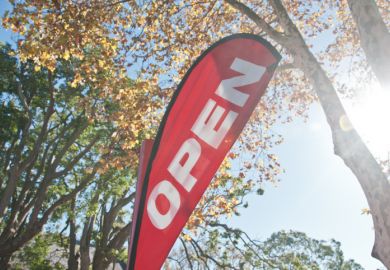Open access advocates are calling for a globally coordinated approach to “scholarly infrastructure”, saying knowledge is trapped behind paywalls and Europe’s Plan S initiative solves only part of the problem.
Lobby groups around the world have teamed up to run a stocktake of existing infrastructure and to direct spending on future needs, under the guise of a new alliance called Invest in Open Infrastructure (IOI).
Co-founder Ginny Barbour said IOI was a “separate but necessary” initiative to Plan S, which is focused on making journal articles openly accessible. “Journals are largely owned by a relatively small number of for-profit publishers, and the same is happening for infrastructure,” said Dr Barbour, director of the Australasian Open Access Strategy Group.
“Pretty much all the manuscript submission systems currently available for people to run their journals on are based on proprietary software increasingly owned by the same publishers that own the journals.”
She said the same thing applied to repositories. Pure, repository software owned by publishing giant Elsevier, was increasingly attracting universities’ custom. This made it hard to ensure that repositories, publishing platforms and big data tools were compatible with each other.
“The code is not available for people to build on,” Dr Barbour said. “You’re relying on the goodwill of commercial companies to make it happen. If you have open source software, you don’t have to rely on anyone’s goodwill.
“If somebody comes up with a really great idea for using research to do something nobody’s thought of, they can build a tool that will integrate seamlessly with tools already out there.”
She said IOI was the “next stage” from initiatives such as the Global Sustainability Coalition for Open Science Services (SCOSS), which – like Plan S – was primarily about open access publishing. “IOI takes a much broader view across the entire scholarly communications landscape – everything from repositories to smart tools that you might use post-publication.
“A lot of people think that somebody’s already funding this type of initiative. When they become aware it’s not funded, it becomes a priority.”
Dr Barbour said IOI was an “oversight group” and would not itself distribute funds. But she predicted that funders would take its advice seriously, given that member bodies such as the Scholarly Publishing and Academic Resources Coalition or SPARC already wielded considerable influence with US institutions and government agencies.
Another member, the Open Research Funders Group, had the ear of “big philanthropic funders” such as the Gates Foundation, she said.
The group wants more agencies to sign up and contribute to its infrastructure census. Dr Barbour said the response since IOI’s formal launch had been encouraging, and that it would gain traction in a “relatively short” period. “People recognise the need for this to happen.”
She said IOI was also seeking funding to manage itself. The group has not yet established where the operating cash will come from, how many staff will be needed or where it will be based.
Register to continue
Why register?
- Registration is free and only takes a moment
- Once registered, you can read 3 articles a month
- Sign up for our newsletter
Subscribe
Or subscribe for unlimited access to:
- Unlimited access to news, views, insights & reviews
- Digital editions
- Digital access to THE’s university and college rankings analysis
Already registered or a current subscriber?








